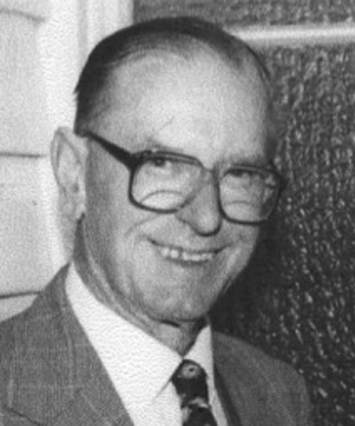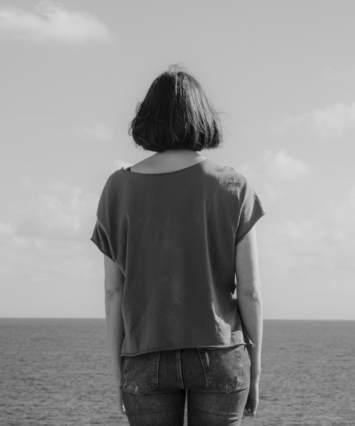Mick was born in Edendale, Southland in an area once dismissed as `mere bog' but which has become an attractive and thriving region, the farmyard of New Zealand. Both sheep and dairy farming is intense in the cool, moist climate that Mick grew up in. Edendale' s modern dairy factory is its main feature, known internationally. Mick enjoyed fishing in the Mataura, the world' s best brown trout fishing river. Southland 's bracing southerly winds produce strong characters, and Mick was certainly one of them.
Mick was not an academic student. He once wrote, "I often think of some of my primary school teachers. They would die of shock if they knew my children and grand-children moved in academic circles! I was a great trial to them, as they were to me!" Mick loved all sports, especially rugby, and followed the All Blacks' (rugby) and Black Caps' (cricket) fortunes throughout his life.
Mick trained as a carpenter and joined a communist-led union, militant and divided, and of great concern to the Labour government. While there, in the 1930s, he met through his wife Olive what the London Independent described as "a network of people around the world committed to a programme of personal change which could issue in family and social change". The Oxford Group, as it was then called, challenged people to live absolute moral standards and to seek the guidance of God in personal and national affairs. The results were often the mending of broken homes, the building of trust between labour and management, the payment of taxes that had been cheated on, the ending of bitterness in many hearts, and the uniting of races.
Mick and Olive dedicated their lives to this work. He subsequently served on the Wellington and NZ Executives of the Carpenters' Union, and sought to have issues resolved on a non-factional basis and on the basis of what was right for the country. This brought a change in the leadership in the union, much to the delight of Prime Minister Peter Fraser, who, on learning of Mick's part and connection with MRA, said, "If that is MRA then I want it for the country."
A frequent visitor to Australia, Mick believed in trans-Tasman partnership. The biggest venture he and Olive were part of, and central to, was the coming of the Australian MRA force with the industrial play The Forgotten Factor in 1950. The Invitation was signed by numerous cabinet ministers, members of parliament, mayors and Union and management leaders. Special letters of support were sent by the Prime Minister, Peter Fraser, and the Leader of the Opposition, Sydney Holland. lt was a remarkable tour. 32,000 saw the play and hundreds of lives were changed, including my father, Lawrie Cooper.
Sir Keith Holyoake, Sir Walter Nash and Sir John Marshall were all later Prime Ministers who valued Mick's friendship and took initiatives to help the the advancement of MRA in NZ.
Mick was a remarkable correspondent. The flow of caring letters, often hand-written, kept going right up till his last illness prevented any more writing. His last letter to me had a typical sentence, "Thanks for news of you all, you feature frequently in my prayers."
A frequent theme in his letters and life was his concern for Maori-Pakeha relations. He poured himself out to build bridges of trust and friendship with Maori friends, often travelling with one or another overseas to conferences, especially Kahi Harawira in the 50s, young Maori to Australia and India in the 60s, and Canon Wi and Ybel Huata, Tom Ormond and many others in the 70s and 80s. His last visit to Caux, the Swiss conference centre for MRA, in 1997, was to accompany the Maori Queen, Dame Teatairangikaahu, Mrs Joan Bolger, the wife of the Prime Minister, and other Maori and Pakeha leaders. Mick referred to this as "the high point in 60 years of MRA in NZ, and truly a gift of God. I believe it is meant to be an ongoing feature of our work."
The outreach of Mick's life will never be fully known. One can sense it from the comment emailed this week from Suresh Khatri, a Fijian who met MRA here in Auckland. He wrote, "Mick has done as much and even more for Fiji and the South Pacific as any other Kiwi ever has."
A former Race Relations Conciliator, Dr Rajen Prasad, came from Fiji. He once stated publicly, "I am growing hoarse from four years of issuing increasingly strident warnings about the perilous state of race relations in this country." Mick responded, "There is no doubt throughout the Pacific, the element of race is becoming more sharply focussed." The dream of winning power for the indigenous people "could be written off as the dream of ambitious and bitter people, but one note that struck me was the underlying sense of hurt and, I felt, longing for past wrongs to be acknowledged. I wonder now if there is an initiative we can take with Maori colleagues, to bring a sense of healing and reconciliation. The Crown's apology did not cover (many specific) incidents. I raise this now for prayer. God alone can arrange these things."
In 1998, Mick completed a ten-year research project and published The Whole Round Earth to Span, recording his personal story of Moral Re-Armament in New Zealand over 66 years. The title came from the `signature tune' of the Oxford Group, the chorus of which went,
To build together what none shall sever,
Bridges from man to man, the whole round earth to span.
Mick's life did just that - built bridges between people, spanning the whole round earth. We give thanks to God for his and Olive' s generosity of heart, dedicated work, and vision for all, to find and follow God's plan. Mick was always challenging, and adaptable. He wrote in 1998, "The strategy of the past needs updating" while the last sentence in his book was, "The work has just begun!"
Ka mate he totara nui. A mighty totara has fallen. May its seeds grow in those who follow.
English



